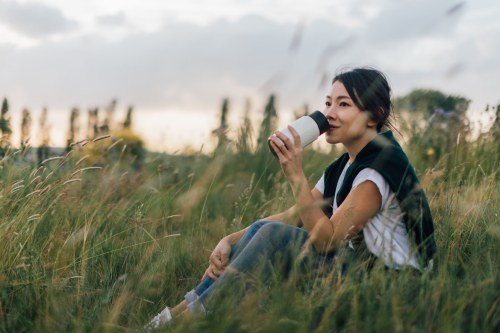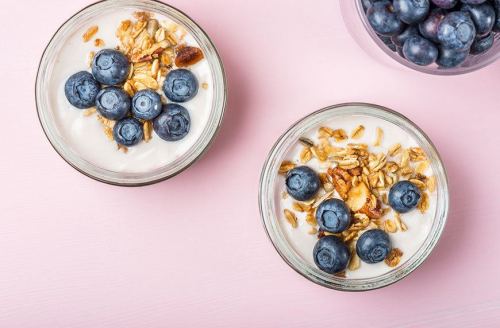As soon as there’s even a hint of springtime, I start my day with a nasal spray. For me, it’s the best time to take allergy medicine to stop symptoms in their tracks. And while it makes a bit of a difference for my congestion, it does nothing for the general fogginess and exhaustion that accompany my allergies.
Experts in This Article
allergist, immunologist, and medical advisor with the Allergy &
So I stopped to think: Does coffee help with seasonal allergies? Yes, it does, says immunologist Purvi Parikh, MD—and its benefits go beyond just fighting exhaustion and brain fog. (One more reason to have coffee first thing in the morning.)
Why you should sip coffee for allergy symptom relief
“Caffeine helps with sleepiness as we all know, but it can also help with congestion,” says Dr. Parikh. “With allergies, you get inflammation and congestion of your blood vessels, and then you get inflammation in your nose, too, because basically your nose is blocked up from the allergic reaction. And the same thing happens in your head. You’re basically feeling the congestion in your sinuses, in your head, and that can make people feel tired and fatigued.”
Caffeine is especially helpful when taken with other allergy medicines, especially the kind that make you drowsy, says Dr. Parikh.
“Most allergy pills are antihistamines that make you sleepy. They help with symptoms, but a side effect of Benadryl, Claritin, Zyrtec, and Xyzal, among others, is drowsiness,” says Dr. Parikh. “Your allergies [can be] causing the fatigue, but then ironically, it could also be the medication you’re taking.”
So, a cup of joe can combat these effects, but you may also want to work with your allergist to find non-drowsy or topical options, such as certain nasal sprays or eye drops. “Those are a good option if you’re someone who is very sensitive and sleepy from the allergy pills,” Dr. Parikh says. “But the caffeine definitely helps, too.”
On that note, you may also want to continue the effects of drinking coffee when sick, although it may not be ideal for everyone.
How much coffee to drink to help with seasonal allergies
The amount of coffee you need to feel the effect on your seasonal allergies depends on your tolerance. As someone who is very sensitive to caffeine, this is music to my ears. “Some people are very sensitive to caffeine. Some people who drink it constantly are not as sensitive to it,” says Dr. Parikh. Still: “The equivalent of one cup of coffee is plenty for most people.”
On days when my allergies make me feel particularly foggy, I swap decaffeinated lattes for half-decaf/half-caffeinated cup of coffee (also a go-to when I’m craving coffee after dinner). The change definitely improves my focus. So the next time you’re depleted by your seasonal allergies, reach for a cup (or an extra cup) of joe.
Can caffeine make allergies worse?
We know there can be benefits to drinking coffee during allergy season, but there are some consequences to caffeine, too.
According to the London Allergy and Immunology Clinic, caffeine is naturally high in histamines—a chemical released by your immune system. Histamine is the culprit that causes itching and other allergy symptoms (hence the name “antihistamines” for many allergy meds), per the Cleveland Clinic. Drinking coffee or any other caffeinated drink will cause histamine release in your body. The amount of histamines likely depends on the amount of coffee you drink, but according to an older July 2014 study in the American Journal of Physiology-Regulatory, Integrative and Comparative Physiology1, researchers found that histamine levels increase after around 30 minutes of having caffeine and stay elevated for at least two hours.
The more caffeinated drinks you have, the worse your congestion and inflammation may be. In other words, it may be a balancing act when it comes to coffee for allergies: A little can help, but too much may actually make symptoms worse.
Other drinks that may help with allergies
Fight back against allergy symptoms with immune-boosting drinks that can help relieve symptoms. And you don’t have to get too complicated— they’re probably more simple than you realize.
Water
Yep, good ole’ H2O can help with allergy symptoms, like a pesky sore throat and congestion. The Premier Allergy and Asthma Center suggests staying hydrated throughout the day to thin out mucus and avoid buildup.
Tea
Hot tea is another sore throat soother that can provide herbal allergy relief. The choice of tea is up to you, but the most effective types include green tea, peppermint, and chamomile. These teas fight inflammation with their natural antihistamine properties, per the Premier Allergy and Asthma Center.
Orange juice
Vitamin C is a natural powerhouse for our immune systems. It can also stand up against allergies, thanks to its natural antihistamine effects. That’s what makes fresh orange juice one of the best drinks to fight allergies. Other sources of vitamin C are good too, like strawberries, lemons, grapefruit, and kiwi.
Other natural allergy remedies
If allergy medication isn’t your jam or not getting the job done, try some home remedies for allergies that can make symptoms a little less intrusive. The Mayo Clinic suggests the following:
- Reduce exposure to triggers by staying indoors on high-allergen days
- Shower daily: Wash away allergens from skin and hair at the end of the day
- Use an air purifier indoors
- Rinse your sinuses with saline solution
—reviewed by Jennifer Gilbert, MD, MPH
-
American Journal of Physiology-Regulatory, Integrative and Comparative Physiology 2014 307:6, R704-R710
↩︎
Sign Up for Our Daily Newsletter
Get all the latest in wellness, trends, food, fitness, beauty, and more delivered right to your inbox.
Got it, you've been added to our email list.











